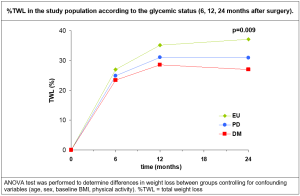Context: Bariatric surgery is the most effective treatment to achieve weight loss and sleeve gastrectomy (SG) is currently the most common performed procedure. Previous data suggested a lower total weight loss (TWL) among obese patients affected by diabetes following both pharmacological treatment and bariatric surgery, but less is known about patients with prediabetes. Objective: To assess the %TWL at 6, 12 and 24 months after SG according to the pre-procedure glycemic status. Design: Retrospective analysis of a set of data about 404 patients with morbid obesity attending the outpatients service of a single center segregated into patients with overt diabetes (DM n=98), patients with prediabetes (PD n=174) and euglycemic patients (EU n=132) based on the definition of the ADA using fasting blood glucose and glycosylated hemoglobin. Results: TWL 24 months after SG was lower in DM (27.0±11.1%) compared to PD (30.9±10.5%) and EU patients (37.1±9.8%) and comparison between each of the considered groups showed a statistically significant difference (p<0.05). After statistical adjustment for known potential confounders (age, sex, baseline BMI, physical activity), the results were confirmed 12 months (p=0.012 EU vs DM and PD) and 24 months (p=0.004) after SG. Lastly, these results were supported by multiple regression which showed that 24 months %TWL was associated with baseline glycemic status and age. Conclusions: In morbidly obese individuals, %TWL following SG was reduced in patients with T2DM but also in patients with prediabetes, supporting the hypothesis that not only diabetes but also prediabetes may induce resistance to the therapeutic effect of anti-obesity treatments.


